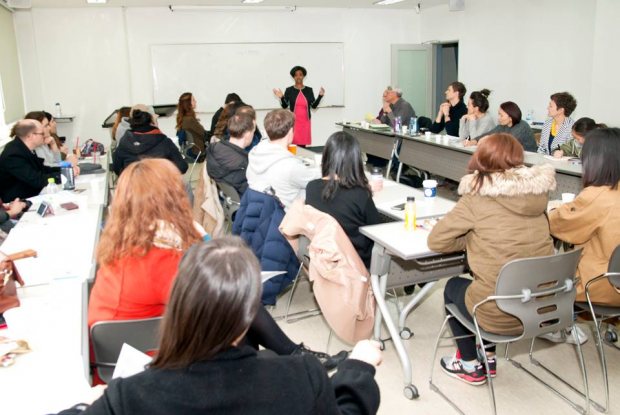
Jeonju-North Jeolla KOTESOL is excited to announce our April workshop for teachers, teacher trainees, or anyone interested in English education in Korea.
This month’s workshops include: transferring teaching skills into presentation skills (and vice versa) (with Aaron Snowberger); and playing some conversation games which we can take to our classrooms on Monday (as presented by Lindsay Herron).
Presentation 1
Speak Better: Become a Better Presenter by Becoming a Better Teacher (and vice versa)
by Aaron Snowberger
Abstract:
Think about it. As a teacher, you are literally a paid, professional, public speaker. Are you good at it? Could you be better? In my experience, there are a number of things each one of us can do to increase our public speaking skills, both in the classroom and out. And what you learn, do, and apply in the classroom can have a great impact on how you speak at professional venues. Come learn the THREE core skills that you can use to take your presentations from blah to bravo.
Bio:
Aaron Snowberger is an English teacher at Jeonju University, with over 6 years experience at the university level and 10 years teaching experience in Korea. He also teaches Computer Science, Computer Literacy, and Graphic Design courses at Global Prodigy Academy international high school. He views public speaking as an essential aspect of teaching jobs, and believes that what you do in the classroom can be directly applied to public presentations. In other words, to become a better presenter, focus on becoming a better teacher.
Presentation 2
Easy-to-Adapt Conversation Games: Some Basic Types to Take and Tweak
Lindsay Herron
Abstract:
Are you looking for communication games for your English conversation class? This workshop can help! Participants will have the opportunity to experience a wide variety of games and game types, mostly drawn from the work of Jill Hadfield. All arecommunicative, and thus require students to listen and speak for a purpose; and all provide a strong, engaging context for language use. By the end of the workshop, attendees will be thinking more creatively about how to incorporate games into their classes and will have three to five basic structures that can be readily adapted to any lesson they teach.
The focus of the workshop will depend on attendees’ interest. Attendees can choose from among these game types:
• Guessing games, in which one or more players have information, and the other players try to guess it;
• Search games or puzzle-solving games, in which players must talk with each other to gain lots of different information, and then use that information to solve a puzzle;
• Matching games, in which players try to match corresponding cards or information;
• Matching-up games, in which players each have a different list of possibilities, and then they use discussion and compromise to reach an agreement;
• Exchanging and collecting games, in which players have certain items they can exchange with other players in order to complete a set;
• Grouping games or combining activities, in which players use the given information to arrange themselves into a group;
• Arranging or sequencing games, in which players must exchange information in order to arrange something in a particular order.
Bio:
Lindsay Herron has been a visiting professor at Gwangju National University of Education since 2008. Prior to that, she taught English on a Fulbright grant at a boys’ high school in Jeju-do. She has a master’s degree in language education from Indiana University—Bloomington, a master’s in cinema studies from New York University, bachelor’s degrees in English and psychology from Swarthmore College, a CELTA, and the CELTA YL Extension. She is currently the national president of KOTESOL and treasurer of the Gwangju-Jeonnam chapter.


